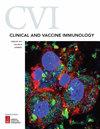由本刊编辑从本刊精选的重要文章
Q2 Biochemistry, Genetics and Molecular Biology
引用次数: 0
摘要
大肠杆菌K1菌株是新生儿败血症和脑膜炎的主要原因,并与不良临床结果相关。它们在通过不明确的机制转运到血液之前在新生儿的胃肠道中定植。McCarthy等人(p. 3704 -3711)表明,大肠杆菌蛋白是一种导致真核细胞遗传不稳定的基因毒素,广泛分布于大肠杆菌K1分离株中,是最佳胃肠道定植所必需的,并有助于进入新生大鼠的血液。他们首次证明大肠杆菌素对侵袭性新生儿疾病有重要作用,可能成为治疗干预的目标。本文章由计算机程序翻译,如有差异,请以英文原文为准。
Articles of Significant Interest Selected from This Issue by the Editors
Escherichia coli K1 strains are a major cause of neonatal sepsis and meningitis and are associated with poor clinical outcome. They colonize the gastrointestinal tract of the newborn infant before translocation to the blood by poorly defined mechanisms. McCarthy et al. (p. 3704 –3711) show that colibactin, a genotoxin that causes genetic instability in eukaryotic cells, is widely distributed amongst E. coli K1 isolates, is required for optimal gastrointestinal colonization, and facilitates entry into the bloodstream of neonatal rats. They demonstrate for the first time that colibactin makes a significant contribution to invasive neonatal disease and may be a target for therapeutic intervention.
求助全文
通过发布文献求助,成功后即可免费获取论文全文。
去求助
来源期刊

Clinical and Vaccine Immunology
医学-传染病学
CiteScore
2.88
自引率
0.00%
发文量
0
审稿时长
1.5 months
期刊介绍:
Cessation. First launched as Clinical and Diagnostic Laboratory Immunology (CDLI) in 1994, CVI published articles that enhanced the understanding of the immune response in health and disease and after vaccination by showcasing discoveries in clinical, laboratory, and vaccine immunology. CVI was committed to advancing all aspects of vaccine research and immunization, including discovery of new vaccine antigens and vaccine design, development and evaluation of vaccines in animal models and in humans, characterization of immune responses and mechanisms of vaccine action, controlled challenge studies to assess vaccine efficacy, study of vaccine vectors, adjuvants, and immunomodulators, immune correlates of protection, and clinical trials.
 求助内容:
求助内容: 应助结果提醒方式:
应助结果提醒方式:


